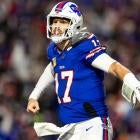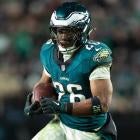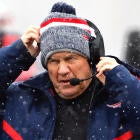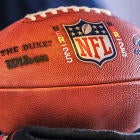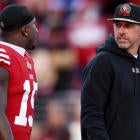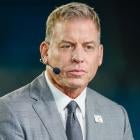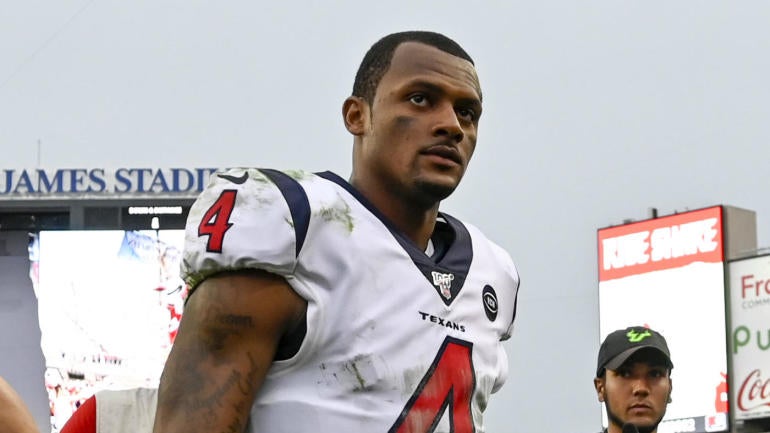
The Houston Texans play the Kansas City Chiefs in six days to ring in the 2020 NFL season. Before the ball is kicked, the Texans should have made Deshaun Watson one of the highest-paid players in NFL history.
Both the Texans and Watson's camp are keeping their cards close to the vest on this one, but obviously Watson desires a big contract after seeing the half-billion deal Patrick Mahomes received over the summer. There's a strong belief an extension will be done by Thursday that ties him to the Texans through the middle part of this decade and sees him average at or above $37 million per year.
"My agent and the organization are continuing to handle that," Watson said earlier this week. "My main focus is just getting ready for next week."
Texans head coach and GM Bill O'Brien gave his requisite sound byte, too.
"I don't really want to get into specific contract talks but quite obviously we want Deshaun Watson to be here for a long time," O'Brien said. "He's had a great training camp. He's a great player and we're going to work hard to get that done."
Not only has Watson's play been deserving of a fat deal, but the Texans and BOB have backed themselves into a corner with the Laremy Tunsil deal. By making Tunsil the highest-paid offensive lineman in the league, the Texans have shown they certainly can't skimp on the engine that makes the whole thing go. And that's Watson.
"Bill's a fair guy," said one league source. "He knows what his team is and is not without Deshaun."
According to Over The Cap, Watson ranks 39th among all quarterbacks in average annual salary at $3.46 million. His cap hit this season is just $4.4 million in 2020, with his $17.54 million fifth-year option waiting in 2021. Four of Watson's offensive teammates rank in the top eight in terms of average annual salary at their positions: Tunsil, David Johnson, Nick Martin and Brandin Cooks.
Watson, who has led the team to consecutive AFC South titles, has seen his favorite target be traded this offseason. His left tackle received a $22 million per year extension. Linebacker Zach Cunningham just became a top-10 linebacker with his deal earlier in the week.
Because both sides are being tight-lipped, it's hard to imagine the exact structure of the deal. Sources around the league are expecting what essentially amounts to a four-year, $150 million extension.
Russell Wilson was at the top of the market at $35 million per year before Mahomes blew it out at $45 million per. Watson's deal will have to eclipse Wilson's -- and not just by a dollar -- but I can't see him getting the sort of average value Mahomes got.
Watson has two torn ACLs in his background and doesn't have a Super Bowl or league MVP to his name like Mahomes. The Chiefs got both the rights to Mahomes through his mid-30s and were very short on up-front guaranteed money, so Watson can "beat" Mahomes easily on his deal when it comes to returning to free agency while still in his prime and getting more upfront money at signing.
Player strike?
A hot question last week that's cooled lately is, will NFL players protest racial injustice and police brutality by not playing in Week 1?
The answer: Impossible to say what any individual will do, but it's unlikely we'll see anything like what happened in the NBA last week with playoff games being postponed.
We know that another act of police brutality caught on video can change everything, and knowing what's on the minds of the 1,696 players who will be on active rosters in Week 1 is implausible. But sources I've spoken to since the NBA's wildcat strike aren't expecting anything similar in the NFL.
If an active player doesn't suit up for the game -- and you can call it a strike or boycott or whatever you may prefer -- the guaranteed money in his contract is in jeopardy of voiding. That's a massive financial risk in a league where the average player lasts about three seasons.
It appears that veteran players who have the ears of the league and union offices are more interested in actionable items like using political leverage to hold accountable police officers who violate a person's rights. I'm not saying this is a "we've moved past kneeling" thing like Jay Z stated about Colin Kaepernick last year, but players seem to understand the risks of sitting out a game as an individual and are focused more on using their power and influence to impact change.
If there is a widespread movement around the league to not play Week 1, sources would be buzzing. At this time, they are not. Additionally, the CBA is crystal clear about a potential strike.
"[N]either the NFLPA nor any of its members will engage in any strike, work stoppage, or other concerted action interfering with the operations of the NFL or any Club for the duration of this Agreement," Article 3 of the CBA reads.
As a source put it to me, if a large group of players plan to strike without the protection of the CBA, they'd be relying on team owners and the league office to do what the NBA did and "look the other way." Do you think that's likely?
It's possible a player goes through with not playing, and that is absolutely his right. But he won't be free from the potential professional consequences of that decision.
The Ngakoue perspective
Perspective matters when it comes to looking at Yannick Ngakoue's deal with the Minnesota Vikings.
It's easy to look at the $17.78 million franchise tag he could have signed in Jacksonville, then look at the $12 million deal he signed in Minnesota and realize that, including taxes, he left more than $6 million on the table. But Ngakoue had made up his mind that he would not play in Jacksonville for any amount of money, so whatever Jacksonville was offering didn't actually matter to him. One Jags source described him as "a supreme man of principle."
"It didn't matter what they offered him. He wasn't going back," one league source said.
Ngakoue believes he will continue to be a sack machine in Minnesota, where the Vikings have had a double-digit sack artist every year since George Edwards took over as defensive coach in 2014 and have finished in the top five in the league in sacks three of the past four years.
Just 25, Ngakoue believes he'll have a career year in 2020 in a new city and be primed to break the bank next offseason with good-faith negotiations with GM Rick Spielman.
Testy Tepper
I had planned to leave my exchange Wednesday with Panthers owner David Tepper on Twitter. I wrote about the layoffs/furloughs in this space two weeks ago and felt that Tepper's answer to my question spoke for itself.
But then I heard from a handful of people in and out of the building who wanted to respond to Tepper's comments, so I've decided to do that here.
To recap: In June, Tepper laid off 10 employees for what the team called performance-based reasons. Last month, more than 20 people were laid off or furloughed due to pandemic-related issues. Those 20-plus worked mostly in hospitality, ticketing, marketing and entertainment, and the furloughs are set to last through the end of January.
When I asked Tepper, the 101st richest person in the world with a net worth of $13 billion, how he justified the 30-plus layoffs/furloughs during a pandemic when it doubles the next closest NFL owner, here's what he said:
"You're making a mistake when you talk that way. And you didn't listen to my previous answer. I decide on these decisions based on what's good for the organization and what's good for the individual. It's not good to have an individual sit there idle for a year, year and a half or two years with nothing to do inside an organization. OK? They may think it and that's not good for a person. And it's not an easy decision, OK? But it's the right decision, I think. You're basing this purely on a financial question; this is a human question. And every individual's an individual.
"So I don't know I answer it except for that, OK? I do believe that. It's not like these things were made lightly. You think this was a pure dollar-and-cents answer, OK. It was not. And sometimes, difficult decisions sometimes are still the right decisions. It may seem the right decision for everybody involved at the time but they're still the right decision."
But those I've spoken to said some (but not all) workers were far from idle. Employees had been pulling double duty on the nascent MLS and NFL franchises for months with pay and potential raises frozen due to COVID-19. As it came into focus that fans may not be at games and as Tepper decided to push Charlotte FC's inaugural season a year, he furloughed some of those workers who not only had been pulling double duty and were actively working but also looking for more work.
Though furloughs are to run through the end of January, employees may get their jobs back before then should revenues improve with fans being allowed in the stadium. Furloughed employees still have to pay their premiums to keep their health insurance, and they also weren't able to cash in any unused PTO that resets at the end of season calendar year. If they ultimately don't get their jobs back come early 2021, it's unclear if they'll get any severance, and it's probable they won't if they're able to find another job in the next few months.
Of course Tepper didn't get rich by giving money away. And he can run his business, as the sole owner of the franchise, how he sees fit. But I found the idea that it's "good" for these workers -- the majority of whom are making five figures who were working hard for the organization in prior months -- to be without a paycheck for more than five months during a pandemic to be objectionable. And so did others.










